How to Create the Perfect URL Slug for Your Site
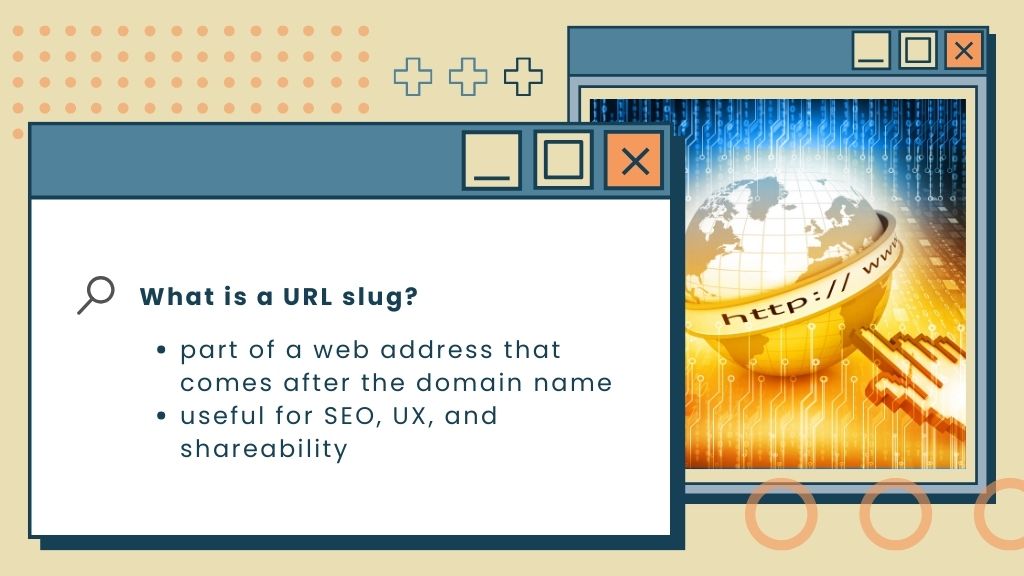
Creating the perfect URL slug is essential for improving your website’s search engine optimization (SEO) and ensuring a positive user experience. A well-crafted URL slug can enhance your site’s visibility in search results, make your URLs more user-friendly, and contribute to higher click-through rates (CTR).
Let’s explore what a URL slug is, why it’s important, and provide practical steps to create the perfect URL slug for your site.
In this article:
- What is a URL Slug?
- Characteristics of a Good URL Slug
- Steps to Create the Perfect URL Slug
- Common URL Slug Mistakes to Avoid
- Examples of Good and Bad URL Slugs
What is a URL Slug?
A URL slug is part of a web address that comes after the domain name and follows the forward-slash (/). It typically describes the content of the specific page and is used by search engines to understand what the page is about. For example, in the URL www.example.com/perfect-url-slug, the slug is “perfect-url-slug.”
Importance of URL Slugs
URL slugs play a crucial role in SEO and user experience. Here’s why they matter:
- SEO Benefits: Search engines use URL slugs to understand the content and context of a page. A relevant and keyword-optimized slug can improve your page’s ranking in search results.
- User Experience: A clean, descriptive URL slug helps users quickly understand what the page is about, making it more likely they’ll click on the link.
- Sharing: Short and readable slugs are easier to share on social media, in emails, and other platforms, increasing your content’s reach.
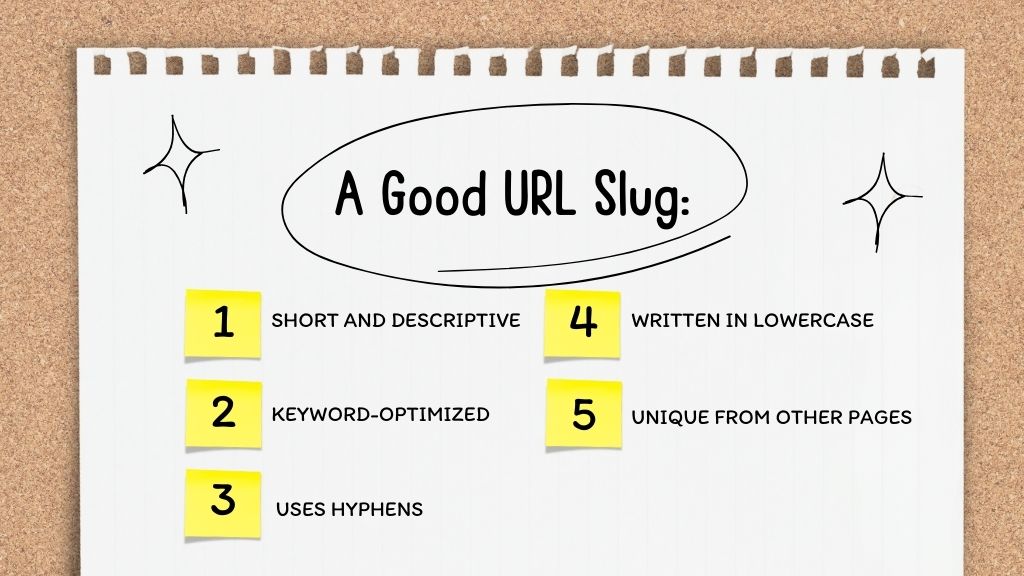
Characteristics of a Good URL Slug
1. Short and Descriptive
A good URL slug is short and to the point. Ideally, it should be no more than 3-5 words. This makes it easier for users to read and remember. Remove stop words like “and,” “the,” or “of” unless they are crucial to the meaning of the slug. Focus on the core keywords that describe the content of the page.
2. Optimized with Keywords
Incorporate relevant keywords into your URL slug. Keywords that align with the page’s content help search engines understand what your page is about and improve your chances of ranking for those terms.
While it’s important to include keywords, avoid cramming too many into your slug. Keyword stuffing can make your URL look spammy and negatively impact user experience and SEO.
3. Uses Hyphens to Separate Words
Use hyphens (-) to separate words in your URL slug. Hyphens improve readability for both users and search engines. For example, www.example.com/best-coffee-shops is easier to read and understand than www.example.com/bestcoffeeshops.
However, don’t use underscores (_) or special characters in your URL slugs. Search engines may interpret underscores as part of a word, and special characters can cause issues with URL encoding.
4. Written in Lowercase
Always use lowercase letters in your URL slugs. This ensures consistency and avoids potential issues with case sensitivity on some servers. Using capital letters in URLs can lead to confusion and errors, as some servers treat URLs differently depending on the case. Stick to lowercase for simplicity.
5. Unique From Other Pages
Each URL slug on your website should be unique. Duplicate slugs can confuse search engines and users, leading to poor SEO performance.
Ensure that the slug accurately reflects the content of the page. This helps with both SEO and user experience, as visitors will have a clear understanding of what to expect from the page.
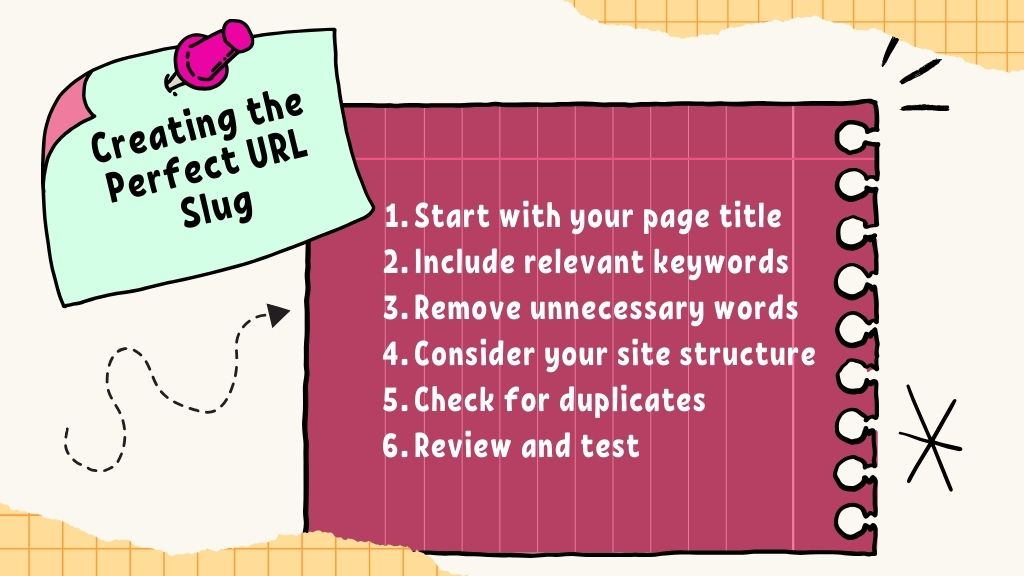
Steps to Create the Perfect URL Slug
Step 1: Start with Your Page Title
Begin by looking at your page title. Identify the keywords or phrases that best describe the content. For example, if your page title is “How to Choose the Best Running Shoes,” the keywords might be “choose,” “best,” and “running shoes.”
Simplify the title by removing unnecessary words and focusing on the core message. From the example above, you might reduce the slug to “best-running-shoes.”
Step 2: Include Relevant Keywords
Use SEO tools like Google Keyword Planner, Ahrefs, or SEMrush to research relevant keywords for your content. Identify the keywords that have good search volume and low keyword difficulty with high relevance to your topic.
Incorporate one or two relevant keywords into your URL slug. Ensure that the keywords fit naturally and do not make the slug too long or awkward.
Step 3: Remove Unnecessary Words
Remove any words that do not add significant value to the slug. Words like “the,” “and,” or “with” can often be omitted without losing meaning.
Streamline your slug to its most essential elements, like the head terms. For example, “how-to-choose-the-best-running-shoes” can be shortened to “best-running-shoes” without losing clarity.
Step 4: Consider Your Site Structure
Your site structure plays a vital role in how search engines and users navigate your content. A well-organized structure ensures that your pages are easily accessible, improving both user experience and SEO.
Make sure your URLs reflect the hierarchy of your site, with clear, logical paths that guide visitors through your content. This not only helps search engines understand your site’s organization but also makes it easier for users to find the information they need.
Step 5: Check for Duplicates
Check that your slug is unique and not already used elsewhere on your site. Duplicate slugs can cause issues with indexing and confuse users.
Make sure that the slug accurately reflects the content of the page. This not only helps with SEO but also sets clear expectations for users.
Step 6: Review and Test
Before finalizing your URL slug, preview it to ensure it looks clean, professional, and easy to understand. Ask yourself if it clearly communicates the content of the page.
Test the URL to make sure it works correctly and does not lead to any errors. Ensure that it redirects properly if needed, and that it displays as expected in the browser.
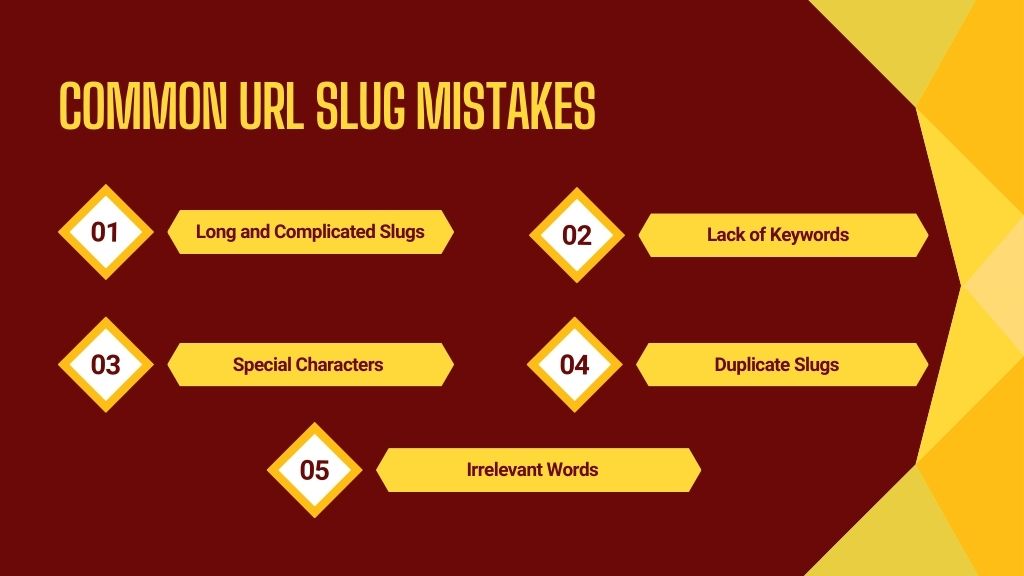
Common URL Slug Mistakes to Avoid
1. Using Long and Complicated Slugs
Long, complicated slugs can be difficult for users to read and remember. They also risk getting cut off in search results, which can reduce their effectiveness. Keep your slugs short and to the point. Focus on the most important words and remove any unnecessary elements.
2. Ignoring Keywords
Ignoring keywords in your URL slug can make it harder for search engines to understand the content of your page. This can negatively impact your rankings. Always incorporate relevant keywords into your slug. This helps search engines index your content more effectively and can improve your search visibility.
3. Using Underscores and Special Characters
Underscores and special characters can cause issues with URL encoding and make your slugs harder to read. Search engines may also misinterpret underscores as part of a word. Stick to using hyphens to separate words in your slug. Avoid any special characters or underscores to maintain clarity and consistency.
4. Creating Duplicate Slugs
Duplicate slugs can confuse search engines and lead to issues with indexing. This can result in lower rankings and a poor user experience. Ensure that each slug on your website is unique. Review your existing slugs before creating new ones to avoid duplication.
5. Using Irrelevant Words
Including irrelevant words in your slug can dilute its meaning and make it less effective. It can also confuse users and search engines about the content of the page. Focus on the most relevant words that accurately describe your content. Remove any words that do not add value or contribute to the overall meaning of the slug.
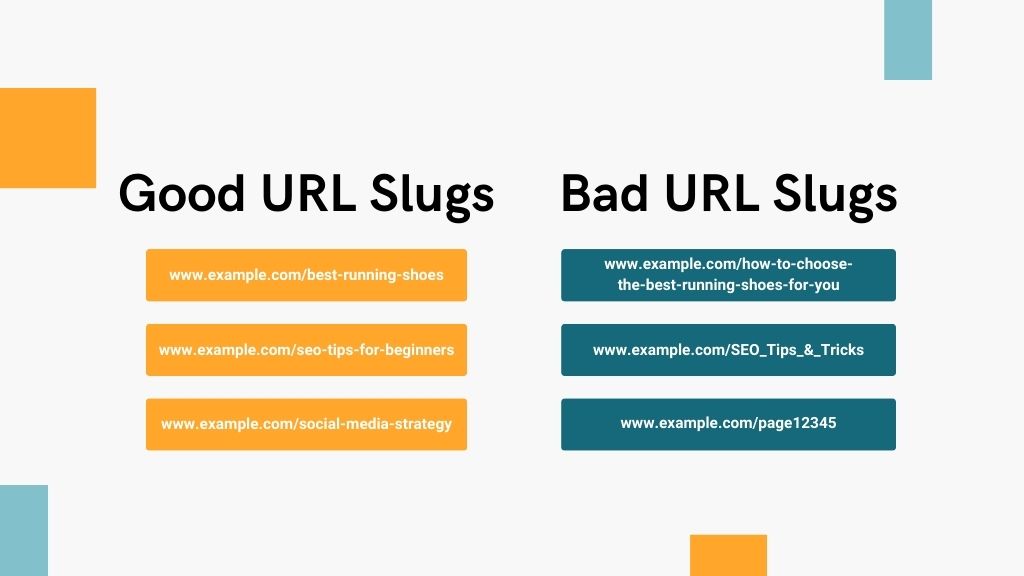
Examples of Good and Bad URL Slugs
Good URL Slugs
- Example 1: www.example.com/best-running-shoes
- Why It’s Good: It’s short, descriptive, and includes relevant keywords.
- Example 2: www.example.com/seo-tips-for-beginners
- Why It’s Good: It clearly describes the content and is easy to read.
- Example 3: www.example.com/social-media-strategy
- Why It’s Good: It uses hyphens, is keyword-rich, and accurately reflects the page content.
Bad URL Slugs
- Example 1: www.example.com/how-to-choose-the-best-running-shoes-for-you
- Why It’s Bad: It’s too long and includes unnecessary words.
- Example 2: www.example.com/SEO_Tips_&_Tricks
- Why It’s Bad: It uses underscores and special characters, making it harder to read and less SEO-friendly.
- Example 3: www.example.com/page12345
- Why It’s Bad: It’s not descriptive and doesn’t provide any information about the page content.
Choosing Your URL Slug Wisely
Creating the perfect URL slug is a key part of optimizing your website for search engines and improving user experience. By keeping your slugs short, descriptive, keyword-rich, and free of unnecessary elements, you can create clean and effective URLs that benefit both your SEO efforts and your audience.
As you refine your approach to crafting the perfect URL slugs, use Link Genius to enhance your overall SEO strategy. Secure high-quality backlinks and boost your site’s authority and visibility. Join the waitlist today and start transforming your SEO with Link Genius!
